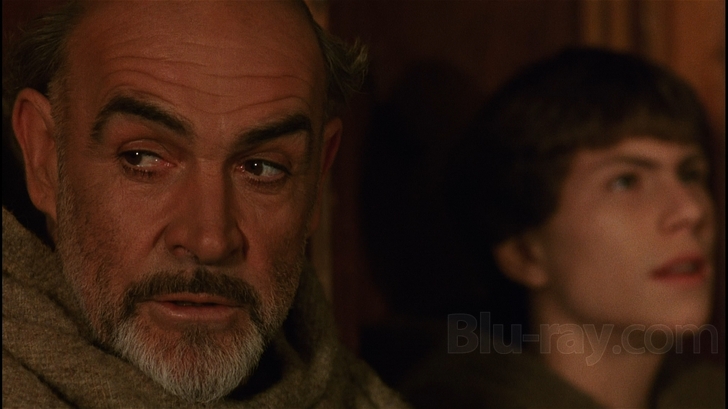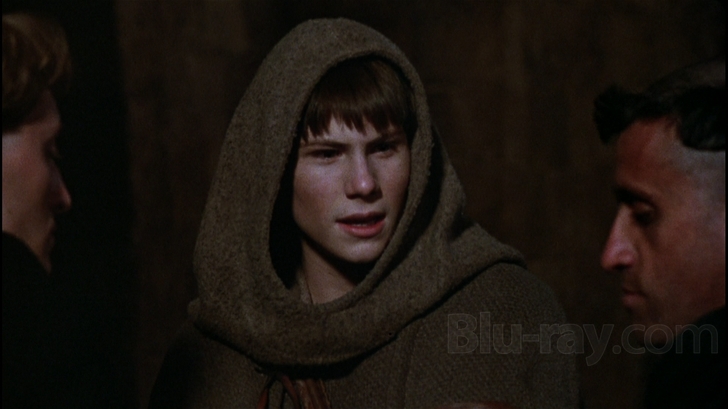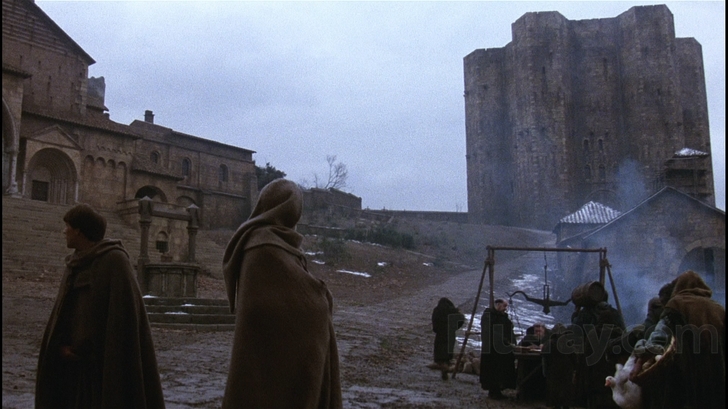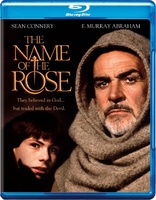The Name of the Rose Blu-ray Movie
HomeThe Name of the Rose Blu-ray Movie 
Warner Bros. | 1986 | 131 min | Rated R | Aug 02, 2011Movie rating
7.6 | / 10 |
Blu-ray rating
| Users | 4.5 | |
| Reviewer | 4.0 | |
| Overall | 4.0 |
Overview
The Name of the Rose (1986)
Adapted from Umberto Eco's best-selling novel, in the 14th century a progressive Franciscan monk called William of Baskerville solves a mysterious death at a secluded Benedictine Abbey with the help of his young novice. Eventually, Bernardo Gui, an inquisitor gets involved, but he may not have the best intentions.
Starring: Sean Connery, Christian Slater, Helmut Qualtinger, Elya Baskin, Michael LonsdaleDirector: Jean-Jacques Annaud
| History | Uncertain |
| Drama | Uncertain |
| Thriller | Uncertain |
| Crime | Uncertain |
| Mystery | Uncertain |
Specifications
Video
Video codec: MPEG-4 AVC
Video resolution: 1080p
Aspect ratio: 1.77:1
Original aspect ratio: 1.85:1
Audio
English: DTS-HD Master Audio 5.1 (48kHz, 24-bit)
French: Dolby Digital 2.0
Spanish: Dolby Digital Mono
Italian: Dolby Digital 2.0
Polish: Dolby Digital 2.0
Czech: Dolby Digital 2.0
Hungarian: Dolby Digital 2.0
Subtitles
English SDH, French, Italian, Portuguese, Spanish, Czech, Danish, Dutch, Finnish, Hungarian, Norwegian, Polish, Swedish
Discs
50GB Blu-ray Disc
Single disc (1 BD)
Playback
Region free
Review
Rating summary
| Movie | 4.0 | |
| Video | 3.5 | |
| Audio | 4.0 | |
| Extras | 3.0 | |
| Overall | 4.0 |
The Name of the Rose Blu-ray Movie Review
The Aristotle Code.
Reviewed by Jeffrey Kauffman July 26, 2011Have your reference books at your side when you watch The Name of the Rose. The first thing you’re going to want to look up is the word “palimpsest,” which crops up immediately in the opening credits with regard to how this film is related to its Umberto Eco source novel. But you might also want to have tomes on history, philosophy, Medieval law, the Inquisition, Benedictine and Franciscan Orders, and any number of other subjects at the ready just in case certain aspects of the film’s literally labyrinthine story don’t instantly make sense to you. Long before Dan Brown captivated worldwide audiences with his similarly research-stuffed The Da Vinci Code, Umberto Eco had done similar service with his The Name of the Rose, a book so convoluted and incessantly referential to all sorts of arcane subjects that a whole cottage industry of “explanatory” books sprang up in its wake, much like in the case of the Brown opus. Some sort of karma led me to both of these books long before they became worldwide sensations. I was drawn to The Da Vinci Code simply because I liked the dustjacket, and then when I read the blurb and saw there was a mystery solving contest involved (remember that from the first edition?), I was hooked and I devoured the book within just a couple of days, about a month or so before it became the international flavor du jour. I frankly can’t recall now what led me to The Name of the Rose a couple of decades earlier, other than that someone who knew of my fascination with religious history may have recommended it to me. As complex as Rose is, especially when compared to the fairly straightforward prose style of Brown, I was almost hypnotically compelled to charge through the novel, and found it one of the most challenging, thought provoking pieces I had ever read up to that point, something that thankfully didn’t depend on my complete understanding of all the issues Eco was raising. And that may in fact be the saving grace not only of Eco’s novel, but of this Jean-Jacques Annaud film as well. For on one level, you can enjoy The Name of the Rose as an ancient Sherlock Holmes murder mystery (it’s no mere coincidence that Eco’s monk hero is William of Baskerville). On another, completely other and much deeper level, there’s a whole convoluted philosophical subtext playing into both the novel, and to a somewhat lesser extent the film, that makes The Name of the Rose catnip for armchair intellectuals.

Umberto Eco’s writing can be as formidable as the subjects he attempts to tackle, and that very aspect may be what kept The Name of the Rose from finding its audience, at least with regard to the United States, when the film was initially released. But on its most basic level, The Name of the Rose is nothing other than a simple detective story, a sort of “very special” Cadfael episode wherein Sean Connery’s Franciscan monk William of Baskerville investigates a series of gruesome deaths at a Benedictine monastery, a monastery which is in the grips of fear it is communally possessed by Satan and which in fact has a few secrets up its cowl. William’s novice Adso (Christian Slater in one of his first major roles) tags along and is really the center of the film’s point of view, as becomes quite clear in the film’s closing moments (in a nice little twist that first time viewers may or may not see coming, and which I won’t spoil here). All of the scholarly detritus surrounding The Name of the Rose’s central mystery can in fact be jettisoned quite easily without much detriment to the film’s momentum, but the fact is, the more you know about philosophy, history, religious orders and even the Inquisition, the more you’ll probably be able to appreciate the many strata that underlie The Name of the Rose’s basic whodunit setup.
Annaud is able to create a very visceral feeling for time and place throughout the film, and rarely has the grit and grime of the Middle Ages been so convincingly brought to film. The production design of The Name of the Rose is one of this film’s crowning achievements, and without giving away too much about one of the story’s major elements, the “hidden” realms of the monastery are gorgeously brought to life. This is an often dark and dingy world, and Annaud’s European aesthetic is perfectly matched to the content of the film (Annaud evidently argued to Eco himself that Eco had written his novel for only one filmmaker to adapt, that individual being of course Annaud).
The Name of the Rose also features a wealth of excellent performances across the board. While Connery seems to be riffing a bit on his “other” Middle Ages role, that of an aging Robin Hood in Richard Lester’s Robin and Marian, he brings his usual gravitas to the role and is immensely enjoyable in this relatively unusual setting. Slater is also uncommonly good, free of the tics that hobbled some of his later performances, here evincing a naďve and somewhat troubled young man as he attempts to come to terms with a monk’s life. But it’s the supporting cast in The Name of the Rose which really shines and gives the film its very provocative edge. The always reliable Ron Perlman is aces as yet another bizarre mutant, in this case the gibbering hunchback Salvatore whose incoherent ramblings provide William with an important clue or two. An international array of fantastic character actors, including William Hickey, Helmut Qualtinger, and an unforgettable Feodor Chaliapin, Jr. populate the monastery with a variety of competing motives and backstories. And then-recent Oscar winner F. Murray Abraham is despicably officious as Grand Inquisitor Bernardo Gui, all too eager to ascribe demonic reasons for the series of hideous deaths William is attempting to investigate with a more rational approach.
The actual solution to the central mystery of what’s going on literally behind the scenes in the monastery may strike a lot of modern day viewers as a major “WTF” moment, but that is part of Eco’s genius, and one which the film at least attempts to deal with in a realistic manner. But Eco’s motives in the story are multilayered, to say the least. The mystery of the deaths may be the hook that captures the reader’s and/or viewer’s interest, but there’s a more central issue at stake, one which involves Adso’s quantum leap into maturity. There’s a reason this project is called The Name of the Rose, and that’s a daunting mystery that armchair sleuths would do well to ponder over as they watch the film.
The Name of the Rose Blu-ray Movie, Video Quality 

There's good news and bad news with regard to The Name of the Rose's AVC encoded 1080p transfer in 1.77:1. Let's get the bad news out of the way first. The Name of the Rose has never been a gorgeous film, partly due to design, and this new Blu-ray doesn't improve the film's inherent softness (especially in second unit outdoor and establishing shots) and grittiness. The good news is the film looks manifestly better and sharper than it did on DVD, especially once we get inside the monastery. The opening sequence is still hobbled by the opticals of the titles, and so don't judge things too harshly by the opening moments. And Annaud obviously was going for a mist-strewn, soft focus ambience a lot of the time, so some of the softness here is certainly intentional. But there are whole new levels of fine detail in this new presentation, including some excellent new shadow detail which was previously hidden in prior home video releases. Grain is still more than evident in this release, as it always has been, but it never devolves here into digital noise levels.
The Name of the Rose Blu-ray Movie, Audio Quality 

The Name of the Rose's lossless DTS-HD Master Audio 5.1 track may not be a bombastic, mind blowing track, but it is very well realized and helps to very effectively establish the ambience of a monastery that is haunted, either figuratively or literally. Weird echoes and other lingering sound effects waft across the soundfield and a surprising amount of low end activity establishes a meancing tone from almost the first moment. Environmental effects are very well handled. Some of the dialogue can be a bit hard to decipher due to the international cast, but overall fidelity is very strong and dynamic range is also excellent. The narration which bookends the film is also nicely mixed and seems to have less of the boxy sound which was evident in the film's DVD release.
The Name of the Rose Blu-ray Movie, Special Features and Extras 

- Commentaries by Jean-Jacques Annaud, one in (heavily accented) English and the other in French (with English subtitles) are a wealth of information. Annaud obviously loved this project and pined to make it, finagling all sorts of multinational financing to bring it to fruition. He talks quite a bit about the filming process, and has some very interesting anecdotes to share, including one kind of funny one about Sean Connery's over preparation leading to him not being able to substitute one very minor word in a line.
- The Abbey of Crime: Umberto Eco's Name of the Rose (SD; 43:26). This German television special on the making of the film has a lot of interesting behind the scenes footage, but it's also somewhat maddening in that the German narrator tends to be telling us what the original English language soundtrack is saying, thereby obliterating that track, while subtitles tell us what the German narrator is saying. Talk about a palimpsest.
- Photo Video Journey (SD; 16:06) offers Annaud hosting a retrospective on the film with an emphasis on locations and production design.
- Theatrical Trailer (SD; 2:10)
The Name of the Rose Blu-ray Movie, Overall Score and Recommendation 

The Name of the Rose was a one of a kind novel, one which defied easy categorization and which required a great deal of attention be paid in order to ferret out its many references and mysteries. That argues against a successful film adaptation, but while this film inarguably loses some of the depth and grandeur of Eco's source novel, it's remarkably faithful to the spirit of the book and it manages to create a very viscerally creepy, almost Fellini-esque, ambience. Part mystery thriller, part philosophical rumination, and part history lesson, The Name of the Rose as a film may not be quite as singular as Eco's novel, but it is still a fascinating and compelling film. Newcomers to this title might be a bit distressed by the softness and graininess of the film, but that's how it's always looked, and the Blu-ray is a marked improvement over the DVD. Highly recommended.
Similar titles
Similar titles you might also like

The Heineken Kidnapping
De Heineken Ontvoering
2011

The Last Duel 4K
2021

Munich
2005

The Agony and the Ecstasy
Fox Studio Classics
1965

Hotel Mumbai
2018

Thirteen Days
2000

Bridge of Spies
2015

All the President's Men
Two-Disc Special Edition | featuring All the President's Men Revisited
1976

Anonymous
2011

The Untouchables 4K
35th Anniversary Edition
1987

K-19: The Widowmaker 4K
Collector's Edition
2002

The Company
2007

United 93
2006

The War Lord
1965

Patriots Day
2016

Zodiac 4K
Theatrical 4K | Director's Cut BD only
2007

The Good Shepherd
2006

Changeling
Academy Awards O-Sleeve
2008

I, Claudius
1976

Mary Magdalene
2018

